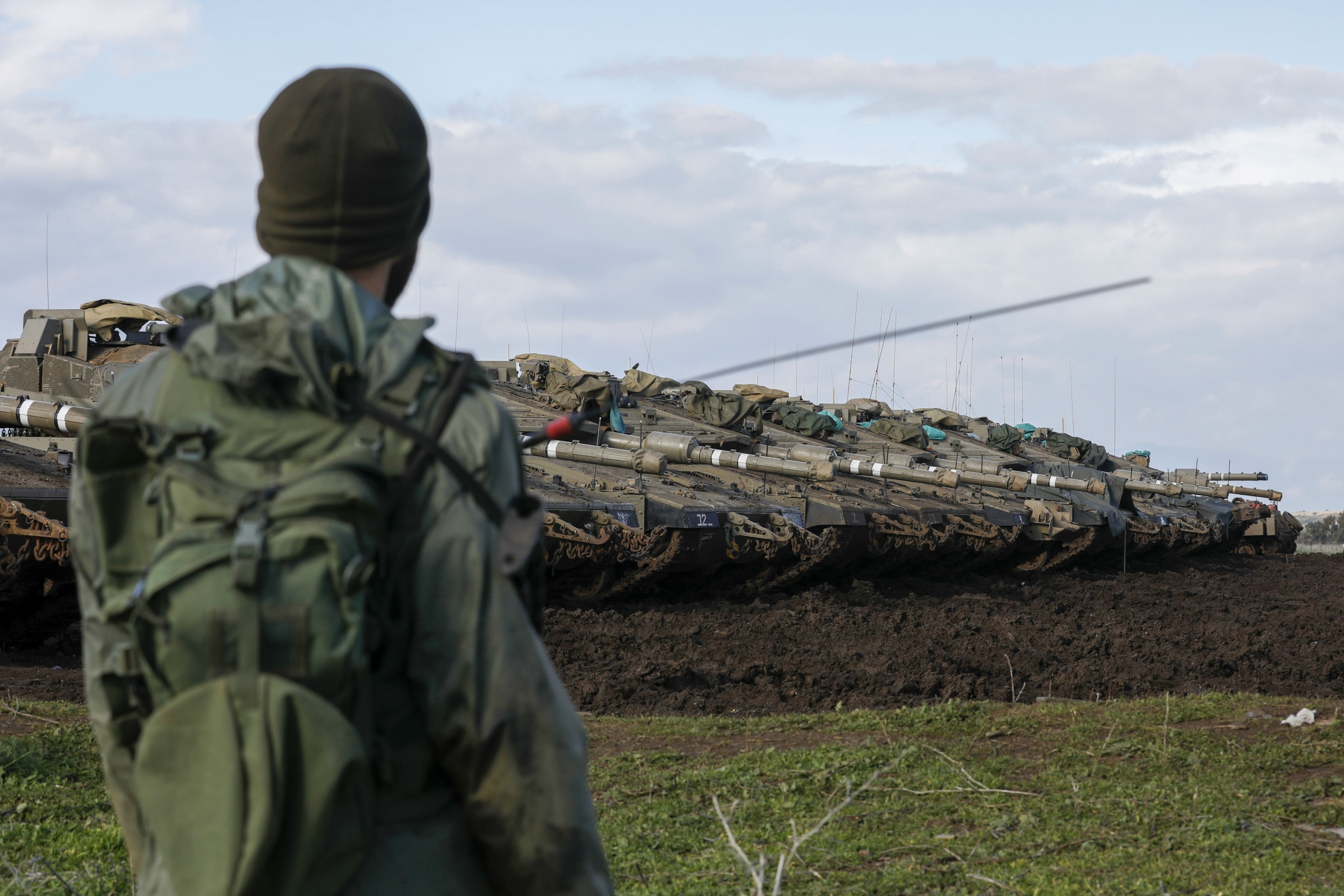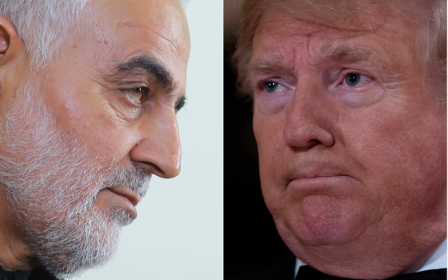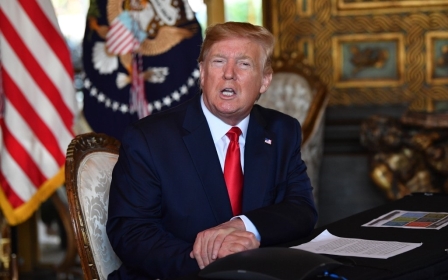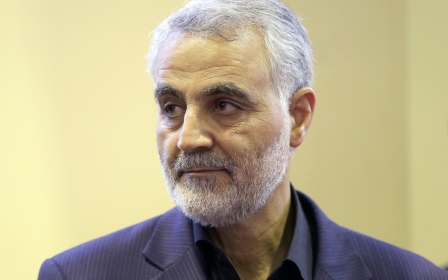After Soleimani's death, Israel just wants to shield itself from the storm

The first Israeli reaction to the assassination of Iranian general Qassem Soleimani was to lower its profile.
Prime Minister Benjamin Netanyahu, who cut short his state visit to Greece and returned home following the news, ordered his cabinet ministers not to give public interviews and statements.
It is meant to signal that Israel wasn’t involved in the assassination of the Quds Force commander and that it doesn’t wish to be dragged into the hostile storm.
Israel hopes that Iranian promises to avenge the death of Soleimani will be confined to actions against US interests, if at all.
Who was Qassem Soleimani?
+ Show - HideIranian Major-General Qassem Soleimani, the shadowy top commander of the Quds Force of the Revolutionary Guards, helped Iran fight proxy wars and increase its foothold across the Middle East.
His assassination in a US air strike on his convoy at Baghdad airport on 3 January marked the end of a man who was celebrated at home and closely watched by the US, Israel and Tehran's regional rival Saudi Arabia.
From working as a teenager to pay off his father’s debts to a swift rise in Tehran’s elite force, Soleimani, 62, was responsible in the end for Iran’s clandestine overseas operations and was often seen on battlefields guiding Iraqi Shia groups in the war against Islamic State.
He was born into an agricultural family in the village of Qanat-e Malek in southeast Iran in 1957. At 13, he moved to the town of Kerman to work in construction and help his father pay back loans, according to a first-person account from Soleimani posted by Defa Press, a site focused on the history of Iran’s eight-year war with Iraq.
When the revolution to oust the shah began in 1978, Soleimani was working for Kerman's municipal water department and organised demonstrations against the monarch. He volunteered for the Revolutionary Guard and, after war with Iraq broke out in 1980, quickly rose through the ranks and went on to battle drug smugglers on the border with Afghanistan.
In 1998, he became chief of the Quds Force, a post in which he helped Iran form regional alliances as it came under pressure from the US sanctions that have devastated its economy. He kept a low profile in this position while he strengthened Iran’s ties with Hezbollah in Lebanon, Syrian President Bashar al-Assad's government and militia groups in Iraq.
At the height of the civil war between Sunni and Shia militants in Iraq in 2007, the US military accused the Quds Force of supplying improvised explosive devices to Shia militants which led to the death of many American soldiers.
As the Americans struggled to stabilise the country and were looking for a broker to help, Soleimani wrote to US General David Petraeus, then commanding US forces in Iraq, in 2008.
"General Petraeus, you should know that I, Qassem Suleimani, control the policy for Iran with respect to Iraq, Lebanon, Gaza and Afghanistan," the commander reportedly wrote in a phone text.
"The ambassador in Baghdad is a Quds Force member. The individual who's going to replace him is a Quds Force member."
Soleimani was arguably even more influential in Syria. Under him, the Quds Force shored up support for Assad when he looked close to defeat in the civil war that has been raging since 2011. His visit to Moscow in the summer of 2015 was the first step in planning for a Russian military intervention that reshaped the Syrian war and forged a new Iranian-Russian alliance in support of Assad.
His activities had made him a repeated target of the US Treasury: Soleimani was sanctioned by the United States for the Quds Force's support for Lebanon's Hezbollah and other armed groups, for his role in Syria’s crackdown against protesters and his alleged involvement in a 2011 plot to assassinate Adel al-Jubeir, then the Saudi ambassador to the United States.
Soleimani’s success in advancing Iran’s agenda had put him in the crosshairs of regional foes Saudi Arabia and Israel even before the US assassination on Friday. In 2017, top Saudi intelligence officials looked into the possibility of using private companies to kill Soleimani, according to the New York Times.
He was killed along with top Iraqi militia commander Abu Mahdi al-Muhandis. Both men were seen as heroes in Iran's fight against its enemies and state television heaped them with praise after their deaths were announced. A Revolutionary Guard spokesman cried during a live broadcast.
Yet Israel has taken precautions.
New MEE newsletter: Jerusalem Dispatch
Sign up to get the latest insights and analysis on Israel-Palestine, alongside Turkey Unpacked and other MEE newsletters
At dawn on Friday, the Israel Defense Forces (IDF) ordered the closure of the Mount Hermon ski resort, which in the past has been targeted with rockets launched by pro-Iranian militias from Syrian soil.
The IDF also put its troops on alert in the occupied Golan Heights, though without sending any reinforcements to the region.
As part of Israeli preparations for any eventualities, the IDF also stepped up its electronic warfare in Syria, unwittingly also partially jamming Israeli civilian phones and communications in the Golan Heights.
A bitter enemy
Soleimani was a bitter enemy of Israel and followed the line of the Iranian regime’s belligerence and hatred towards it, calling Israel the “small Satan”.
The charismatic and adored Iranian general not only targeted Israel rhetorically. As a commander of the Quds Force responsible for special operations outside Iran, Israel was very often on his radar.
Together with the Lebanese Hezbollah movement, he was involved in planning and giving orders to execute terror attacks against Israeli targets, such as the bombing of a bus carrying Israeli tourists in Bulgaria’s Burgas in 2012 and failed attempts in Thailand, Georgia and India.
He also strategised the attempts to encircle Israel by deploying pro-Iranian militias near the Israeli border in Syria and by supervising Hezbollah's war plans against Israel.
Occasionally he ordered the militias to retaliate against Israeli air strikes targeting Iranian proxies in Syria, which would see rockets and drones launched into Israeli territory.
Israeli political and military leaders appreciated Soleimani’s military and strategic skills, and because of it perceived him as a very dangerous rival
Israeli political and military leaders appreciated Soleimani’s military and strategic skills, and because of it perceived him as a very dangerous rival.
He was for Israel a high-value target and appeared on their most-wanted list as a figure who could be a suitable candidate for assassination.
In order to achieve it, Israeli intelligence branches have collected extensive information about him for the last two decades, almost from the moment he was selected in 1998 as the Quds Force’s commander.
Because of his lifestyle, keeping a high profile and rarely going underground looking for shelter, it was easy for Israeli and US intelligence agencies to gather information on him.
He was highly visible, staying in the fields of Syria with his troops, attending public funerals and driving in small convoys from Iraq to Syria and Lebanon.
At least once - but probably more- Israel wanted to kill him and was minutes from achieving it.
The closest shave came in Damascus on 31 January 2008. That evening Soleimani met Hezbollah’s military chief Imad Mughniyeh in one of the Lebanese’s safe houses. Back then, Mughniyeh was considered by Israel as the number one enemy, a bigger threat than Soleimani.
The CIA and Mossad were on the verge of a joint operation to kill the Hezbollah commander. Israel’s then prime minister Ehud Olmert and Mossad head Meir Dagan wanted to kill both. But US President George W Bush declined. He ordered Soleimani to be spared.
All eyes on Iran
Israel’s main concern now is what Iran's reaction will be. That will depend on the country's Supreme Leader Ali Khamenei.
If he decides to respond in a major way by taking the strategic decision to close the Strait of Hormuz, or down a US airliner or bomb a US embassy, it will mean that Iran is ready to take the risk of an all-out war with the US in an election year for both Donald Trump and the Iranian parliament.
In such a scenario, Iran will use all of its power, including activating Hezbollah in Lebanon, militias in Syria and Islamic Jihad in Gaza against Israel.
If Khamenei settled for a more refined, isolated retaliation - for example operating against US troops in Iraq in order to expel them from the country - there is a bigger chance that Israel will not be pushed into a new cycle of violence.
Judging from the past it seems that the supreme leader is a rational player acting from his head and not from his guts.
Surely no one in the region and outside it wants a major war. Not Iran, not the US, nor Russia, nor Syria and nor Israel. It is simply not in any of their interests.
This article is available in French on Middle East Eye French edition.
Middle East Eye delivers independent and unrivalled coverage and analysis of the Middle East, North Africa and beyond. To learn more about republishing this content and the associated fees, please fill out this form. More about MEE can be found here.




